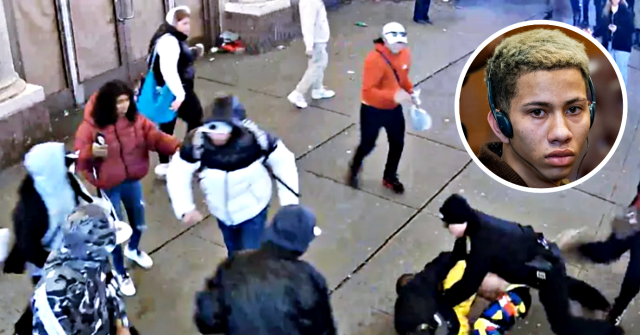In recent developments surrounding immigration policy and public safety, Immigration and Customs Enforcement (ICE) has apprehended Darwin Andres Gomez Izquiel, a Venezuelan migrant linked to a violent incident involving the New York City Police Department (NYPD). This migration case has drawn attention due not only to the violent nature of the crimes committed but also to the broader implications for the Biden administration’s immigration policies. Released into the U.S. by the Department of Homeland Security (DHS), Izquiel was convicted for his role in a mob attack on NYPD officers in Times Square earlier this year, marking a significant point of contention in discussions about immigration enforcement and public safety.
In July, Izquiel pleaded guilty to second-degree assault, following violent confrontations that ignited a media firestorm. During the incident in January, numerous Venezuelan migrants, including alleged members of the Tren de Aragua gang, coordinated an attack on NYPD officers, underscoring rising concerns about violence linked to immigration and organized crime. The attack not only gained national attention but also raised alarms over the involvement of foreign gang members and their potential integration into U.S. communities, prompting calls for a reassessment of how the government manages asylum seekers and migratory safety issues.
Despite receiving a year-long prison sentence for the assault, Izquiel’s situation did not conclude upon serving his term. On October 10, he came under ICE custody as agents sought to deport him from the United States. ICE officials articulated their commitment to ensuring public safety, highlighting that Izquiel poses a significant risk to law enforcement and community members. Kenneth Genalo, an ICE official, emphasized the agency’s determination to uphold laws and prevent communities from becoming havens for noncompliant individuals. This quote illustrates a larger narrative concerning the broader implications of immigration policy on law and order in urban settings.
The timeline of Izquiel’s migration journey reveals a complicated and contentious process. He initially crossed the U.S.-Mexico border illegally on August 23, 2023. Border Patrol agents attempted to expedite his removal upon detection, but Izquiel withdrew his application for admission just days later, opting to return to Mexico voluntarily. However, he subsequently reentered the U.S. on October 3, 2023, where he received a Notice to Appear (NTA) before a federal immigration judge scheduled for June 4, 2024. His subsequent failure to comply with reporting instructions associated with this notice raised concerns about the effectiveness of current immigration enforcement mechanisms.
Izquiel’s case serves as a critical lens through which to examine the practical challenges of immigration enforcement and public safety. His prior dismissal of immigration protocols underscores a systemic issue in how migrants process their status and interact with authorities. With the background of increasing incidents of violence attributed to certain migrant groups, this case reflects a pressing need for reforms that address both the challenges of wrongful entry and the risks posed by those individuals who choose to engage in criminal activities after arriving in the U.S.
In conclusion, the arrest of Darwin Andres Gomez Izquiel encapsulates a pivotal moment in the ongoing dialogue regarding immigration in the United States. It poses fundamental questions about how effectively the current administration is navigating the balance between maintaining humane immigration policies and ensuring the safety and security of citizens. As news continues to surface of various incidents linking immigration to public safety concerns, the ramifications of each case reverberate through the political landscape, prompting renewed debates and legislative inquiries into the future of immigration enforcement and community protection.

